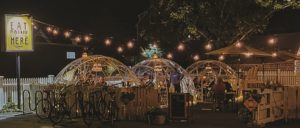PROVINCETOWN — Anticipating a higher-than-normal off-season population in residence coupled with the need to restrict indoor occupancy, local restaurants are looking for creative solutions to staying open this winter. Many have already begun transitioning towards new schedules and layouts as the leaves turn.
A central question is how to serve enough people to make staying open work, even with state regulations that restrict seating density. Liz’s Café has adopted a unique strategy for maximizing capacity in the winter months, constructing four “igloos” in the parking lot that have added 20 outdoor seats, which will be available even in the coldest time of year.
“I saw the igloos in New York City one year around the holidays,” said Chuck Giachinta, who helped come up with the solution at Liz’s. “As we were thinking about what to do in the wintertime, Liz wanted to do a tent, so I sourced out how much a tent would be. It was extremely expensive. And in a tent, you’re in a big room with everyone else, once the flaps go down. So, this way, everyone has their own air and they’re in their own space with their friends.”
Liz Lovati, the owner of Liz’s Café, is seeking approval from town officials to keep the igloos up past the currently scheduled end date of Dec. 31, which the restaurant has been told it is likely to receive.

Other restaurants are working out ways to offer outdoor seating through winter, too. Provincetown Brewing Company (PBC) is working on installing heaters in their outdoor patio, which would allow for outdoor dining year-round.
Many restaurant managers surveyed by the Independent this week said that their planned winter hours are still subject to change.
“This is our first winter staying open, so this is all sort of new to us,” said Michela Murphy of Sal’s Place. “As of right now, we’re planning on still being open seven days a week.” But, Murphy said, “We’re still figuring it out. Our building isn’t insulated, and our beach seating is obviously weather and temperature contingent.”
Beyond falling temperatures, customer demand will also determine some restaurants’ hours in the coming months. PBC, also aiming to stay open through the winter, plans to serve seven days a week.
“If we stay busy, we’ll stay open,” said PBC’s Mike Bucaram, “but if it slows down, we’ll plan accordingly.”
Mac Hay, owner of Mac’s Fish House, sees the limiting factor not to be demand but the local labor supply. He has found it increasingly difficult to find year-round staff, especially after the awarding of J-1 and temporary seasonal visas to foreign workers was suspended this summer.
“We’re still evaluating how much staff we’re going to have,” Hay said. “I think, really, it’s a not a question about demand, because I believe the demand is there. Everybody knows that people are around. Second homes are open longer; people are flocking out of the cities,” he added. “We’re just trying to find enough staff to accommodate that.”
Many restaurants are relying on take-out meals as an increasing share of their business. And even the Soup Kitchen in Provincetown (SKIP) will be offering take-out this winter, albeit with revised hours and a new menu featuring hot food.
The soup kitchen normally serves 90 to 120 meals in an hour, said Bethany Gregory, SKIP’s executive chef. That’s “not something you can do while maintaining social distance,” she added. Gregory said a lot of people have told her “they’re going to miss that aspect of being able to sit down over a meal and talk to people.” Right now, though, she said, “we don’t have the space available to be able to do that.”
Offering take-out meals is not just a product of coronavirus prevention logistics but also financial necessity. Hay said Mac’s Fish House is “100 percent relying on our take-out business to sustain our winter business.”

Despite the low transmission rate on the Outer Cape, abiding by indoor safety guidelines will become a more important factor as some restaurants — Napi’s and Fanizzi’s, for example — close their open-air outdoor seating spaces in the coming weeks. To comply with state regulations, nearly all restaurants will be operating at a reduced seating capacity, which will likely cut into profits.
After a season with coronavirus, the goal for most restaurants that have made it this far is not profitability but survival. “There is a limit to what you can lose,” Hay said, adding that the strategy now is “about keeping people employed and keeping a team together to move forward.”



